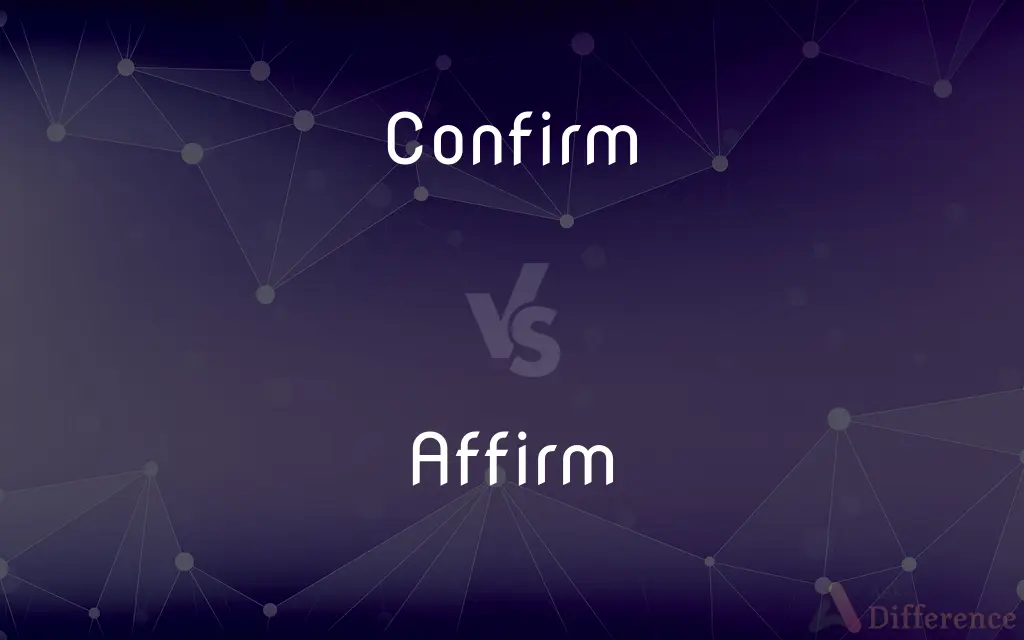Confirm vs. Affirm — What's the Difference?
By Tayyaba Rehman — Updated on October 26, 2023
Confirm means to establish the truth or validity of something, while affirm means to state positively or assert something to be true.

Difference Between Confirm and Affirm
Table of Contents
ADVERTISEMENT
Key Differences
Confirm is used to validate or verify the accuracy of information. Affirm, however, is used to declare something firmly or assert as a fact.
Confirmation often involves a process of checking or proving. Affirmation usually entails a strong declaration or assertion.
Confirm is often used in contexts where evidence or proof is required. Affirm is commonly used in legal contexts or when expressing beliefs or convictions.
The act of confirming typically suggests a finality or conclusion. Affirming, on the other hand, often implies a commitment or support to a belief or statement.
In essence, confirm is about establishing truth through evidence, while affirm is about asserting truth through declaration.
ADVERTISEMENT
Comparison Chart
Definition
To establish truth or validity
To state positively or assert
Context
Requires evidence or proof
Often legal or belief-based
Connotation
Suggests finality or conclusion
Implies commitment or support
Common Usage
Used in verifying information
Used in declarations or assertions
Relation to Truth
Involves checking or proving
Involves strong declaration
Compare with Definitions
Confirm
To verify the truth or accuracy.
We need to confirm the details before proceeding.
Affirm
To declare positively.
He affirmed his commitment to the project.
Confirm
To establish or validate something.
The experiment confirmed the hypothesis.
Affirm
To validate or confirm a belief.
He affirmed his faith during the ceremony.
Confirm
To endorse or ratify formally.
The Senate confirmed the appointment.
Affirm
To assert as a fact.
She affirmed the truth of the statement.
Confirm
To make certain or finalize.
The manager confirmed the meeting time.
Affirm
To state confidently or authoritatively.
The leader affirmed the country's position.
Confirm
To corroborate or support with evidence.
Witnesses confirmed the suspect's alibi.
Affirm
To declare positively; assert to be true
A philosopher affirming the existence of free will.
A document affirming that each student has completed the course.
Confirm
To support or establish the certainty or validity of; verify
Confirm a rumor.
Affirm
To declare support for or belief in
Affirm the right to self-determination.
Confirm
To reaffirm the establishment of (a reservation or advance arrangement).
Affirm
(Law) To rule (a court decision) to have been correct; confirm
The Supreme Court affirmed the lower court's decision.
Confirm
To make firmer; strengthen
Working on the campaign confirmed her intention to go into politics.
Affirm
To assert that one will give true testimony equivalent to that which would be given while under oath.
Confirm
To make valid or binding by a formal or legal act; ratify.
Affirm
To agree, verify or concur; to answer positively.
She affirmed that she would go when I asked her.
Confirm
To administer the religious rite of confirmation to.
Affirm
To assert positively; to tell with confidence; to aver; to maintain as true.
Confirm
To strengthen; to make firm or resolute.
Affirm
To support or encourage.
They did everything they could to affirm the children's self-confidence.
Confirm
To administer the sacrament of confirmation on (someone).
Affirm
To make firm; to confirm, or ratify; especially (legal) to assert or confirm, as a judgment, decree, or order, brought before an appellate court for review.
Confirm
To assure the accuracy of previous statements.
Affirm
(law) To state under a solemn promise to tell the truth which is considered legally equivalent to an oath, especially of those who have religious or other moral objections to swearing oaths; also solemnly affirm.
Confirm
To make firm or firmer; to add strength to; to establish; as, health is confirmed by exercise.
Confirm the crown to me and to mine heirs.
And confirmed the same unto Jacob for a law.
Affirm
To assert or confirm, as a judgment, decree, or order, brought before an appellate court for review.
Confirm
To strengthen in judgment or purpose.
Confirmed, then, I resolveAdam shall share with me in bliss or woe.
Affirm
To assert positively; to tell with confidence; to aver; to maintain as true; - opposed to deny.
Jesus, . . . whom Paul affirmed to be alive.
Confirm
To give new assurance of the truth of; to render certain; to verify; to corroborate; as, to confirm a rumor.
Your eyes shall witness and confirm my tale.
These likelihoods confirm her flight.
Affirm
To declare, as a fact, solemnly, under judicial sanction. See Affirmation, 4.
Confirm
To render valid by formal assent; to complete by a necessary sanction; to ratify; as, to confirm the appoinment of an official; the Senate confirms a treaty.
That treaty so prejudicial ought to have been remitted rather than confimed.
Affirm
To declare or assert positively.
Not that I so affirm, though so it seemTo thee, who hast thy dwelling here on earth.
Confirm
To administer the rite of confirmation to. See Confirmation, 3.
Those which are thus confirmed are thereby supposed to be fit for admission to the sacrament.
Affirm
To make a solemn declaration, before an authorized magistrate or tribunal, under the penalties of perjury; to testify by affirmation.
Confirm
Establish or strengthen as with new evidence or facts;
His story confirmed my doubts
The evidence supports the defendant
Affirm
Establish or strengthen as with new evidence or facts;
His story confirmed my doubts
The evidence supports the defendant
Confirm
Strengthen or make more firm;
The witnesses confirmed the victim's account
Affirm
To declare or affirm solemnly and formally as true;
Before God I swear I am innocent
Confirm
Make more firm;
Confirm thy soul in self-control!
Affirm
Say yes to
Confirm
As of a person to a position;
The Senate confirmed the President's candidate for Secretary of Defense
Affirm
To uphold or support.
The court affirmed the previous decision.
Confirm
Administer the rite of confirmation to;
The children were confirmed in their mother's faith
Common Curiosities
What does affirm mean?
Affirm means to declare positively or assert something as true.
What does confirm mean?
Confirm means to establish the truth or validate something.
Can you confirm a booking?
Yes, you can confirm a booking by verifying it.
What contexts is confirm used in?
Confirm is often used in contexts requiring validation or proof.
In what situations is affirm used?
Affirm is frequently used in legal contexts or when expressing convictions.
Does confirm imply finality?
Yes, confirm often suggests a conclusion or finality.
Is confirm used in legal contexts?
Confirm can be used in legal contexts, particularly in validating information.
Can confirm be about ratifying decisions?
Yes, confirm can involve formally endorsing or ratifying decisions.
Can confirm and affirm be used interchangeably?
While sometimes used interchangeably, they have different nuances; confirm is about verifying, while affirm is about declaring.
Does affirm always involve a declaration?
Yes, affirm typically involves making a declaration or assertion.
Does affirm imply commitment?
Affirm often implies a commitment to a statement or belief.
Is confirm always about proof?
Generally, confirm implies verifying or proving something.
Is affirm about proving truth?
Affirm is more about declaring or stating truth rather than proving it.
Can you affirm a belief?
Yes, you can affirm a belief by declaring it confidently.
Is affirm used in everyday conversation?
Affirm can be used in everyday conversation, especially when asserting beliefs.
Share Your Discovery

Previous Comparison
Sore vs. Soar
Next Comparison
County vs. ParishAuthor Spotlight
Written by
Tayyaba RehmanTayyaba Rehman is a distinguished writer, currently serving as a primary contributor to askdifference.com. As a researcher in semantics and etymology, Tayyaba's passion for the complexity of languages and their distinctions has found a perfect home on the platform. Tayyaba delves into the intricacies of language, distinguishing between commonly confused words and phrases, thereby providing clarity for readers worldwide.
















































